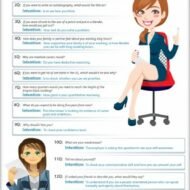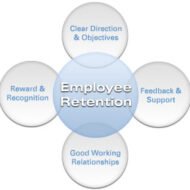Posted by Managementguru in Human Resource, Interview Questions, Strategy, Training & Development
on Jun 5th, 2014 | 0 comments

How do you answer “What is Your Greatest Weakness?” Job Interview Question or JIQ #2 “Our greatest weakness is that, We are unwilling to accept our weaknesses.” If you are subjected to this question in a job interview – “What is your greatest weakness?” what will be your response or reaction? You would have been bowled over by the time your brain scans for some reply (way-out) that would be appropriate. This kind of a question can potentially damage or salvage your job prospects – Yes! It solely depends on how honest you are in dealing with your own weaknesses or short comings and also how wisely you are able to turn it to your advantage. Your response tells the interviewer a lot about your uprightness, so it unquestionably holds a lot of weight.” “To err is human But to forgive is not in an interviewer’s agenda.” Never choose a weakness that indicates your inappropriateness for the job: “A salesman has to be good at communication” “An accountant needs to be good at calculations” “A teacher has to have a patient attitude to manage the students” Will you hire a person with quick temper for a customer relationship position? Will you hire somebody who lacks charisma to be a team-leader? Here, we are just not talking about the technical skills alone, but also about attitude and emotional traits of a person that define his/her personality. Remember that a weakness isn’t necessarily bad: So, the main idea of throwing this question in an interview is not to pull your legs down (though sometimes the interviewee falls a prey by his own naivety), but to gauge how well you can handle or had handled a pressure-situation in previous jobs. Try not to expose your personal weakness- If you say you can’t get up early in the morning, do you think your hiring manager will appreciate the idea? Try to rationalize how you transformed a weakness into strength by perception and perseverance in a purely job-related context. Don’t blurt stereo-type answers: Be direct in your approach and avoid stereo-type answers which will irritate the interviewers; I’m a perfectionist, I pay attention to detail, I never relax, I’m a workaholic- all these responses will sure-fire you from the prospective list. These are neither strengths nor weaknesses but only hypocritical projections of your “self.” These kind of compliments should come from people around you and sometimes it is funny how the greatest strength becomes the greatest weakness too. Do Your Homework Properly: Think about this, if you are a workaholic who spends 15 hours a day adding prosperity to the company, your boss might be happy, but will your wife and children be happy? I’m able to feel the heat from the women folk – the same applies to you too. Though the subject deviates to work-life balance, the undercurrent of the discussion is not to mention your weakness that is directly related to the job you are applying for. Do your homework properly by analyzing the job specification and description thoroughly and decide if you will fit the bill. Mention the areas you are trying to improve upon; you can very well say, “I’m trying to improve my prioritization skills which would help me to line up tasks and complete projects well within the time limit.” You can highlight how you were an introvert and how you have transformed yourself as a “people-person” by realizing that it is the order of the day to be successful in a professional environment. Avoid Rehearsed answers: “If you don’t know your weakness, take a personality type quiz and the results...

Posted by Managementguru in Business Management, Human Resource, Organisational behaviour, Principles of Management, Training & Development
on Mar 19th, 2014 | 0 comments

New Paradigms in Employee Retention What is Employee Retention: It refers to the various policies and practices which let the employees stick to an organization for a longer period of time . It refers to the ability of an organization to retain its employees. HRM Practices: A company to ground itself successfully in the chosen field of activity should adhere to sound human resource management practices, as it is firmly believed that human resource is an asset and investment in human capital paves way for comprehensive development. Many firms fail, in spite of being resourceful in terms of capital, infrastructure and technology. The reason shall be attributed to ineffective handling of human skills or misappropriation of human potential. Human resource management involves not only in recruiting and selecting the right people but also empowering them by suitable training to enhance their technical skills and expertise to perform tasks. The Purpose of Training: Training ultimately aims at converting theorists to performers and orients itself towards accomplishing the enterprise objectives. Big corporate companies concentrate on talent acquisition from the pool of fresh graduates and experienced hands in the IT industry as well. They create a lively corporate atmosphere with “an intelligence network” contributing to the success of the organization. Recruitment and Selection: If you have a feeling that, recruitment and selection are mere procedures to be followed for the sake of selection of human resource, kindly change that notion. These are the crucial steps which determine the fate of your organization. People from different disciplines form a team to achieve the goals and objectives of your organization. Leading a group with such diversity is a feat in itself. Selecting knowledge workers whom you believe will achieve your corporate mission and devising the human resource practices in accordance with their work-life balance will yield great results. Training Programmes: Training programs are developed for different spheres of activity by experienced trainers under the guidance of the top management. Proper training to the trainees ensures maximum work done in minimum time. Training not only makes individuals more informative and knowledgeable but also action buffs. Learning is a key process in training that brings about the desired change in behavior. Corporate companies are also concerned about the career prospects of employees working for them, as they are very well aware of the fact that providing lateral and vertical growth prospects for their workers is the only possible way to retain them. Another way for employee retention is to offer compensation on par or higher than industry standards and periodic review of their pay or compensation in accordance with the performance standards. This method of evaluation is suitable only for companies where workers are highly self motivated and have the capability to understand what it takes to reach the next level in their career ladder. Flexi-Timings: Flexibility is introduced in work life by some of the big corporates who try to visualize the practical problems faced by their employees, particularly women, who come to work. They offer “flexi-timings” in work and support by running “crèche” to nurture new borns. It has been proved that a small siesta after lunch improves the brain activity. The HR policies formulated by the management must encompass all the elements needed for a holistic vision, mission and business growth. This can be made possible by maximizing the efficiency of human capital that adds value to the organization. Note: Companies will also continue to remain generous with pay packages but the big change will be that they will invest a lot more in training and development. “Acquiring talent is much more expensive than grooming...




